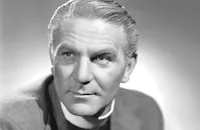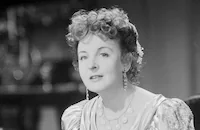Scotland Yard
Brief Synopsis
Cast & Crew
Norman Foster
Nancy Kelly
Edmund Gwenn
John Loder
Henry Wilcoxon
Melville Cooper
Film Details
Technical Specs

Synopsis
Bank robber Dakin Barrolles is trying to escape from Inspector Henry James Cork of Scotland Yard when he slips into the house of Sir John and Lady Sandra Lasher. Lasher, a drunken coward, is verbally berating Sandra because of his fear about leaving the next day for military duty. Barrolles reproaches Lasher, a well-known bank manager, for his harsh words, then takes the car keys and Sandra's locket, which contains photographs of her and Lasher, as a souvenir. Cork apprehends Barrolles as he tries to leave, but the clever thief eludes him. Time passes, and Cork learns that Barrolles entered the Army under an assumed name and has served with great distinction. Although Barrolles was supposedly killed during the battle of Dunkerque, his face has been horribly disfigured and he is sent to a hospital in Scotland. The photographs of Lasher and Sandra are found among his effects, and because he has no other identification, the doctors assume that Barrolles is Lasher. Through plastic surgery, they then re-construct his face so that he looks exactly like Lasher. Sometime later, Sandra is apprehensive upon learning that her mean-tempered husband has been found alive, and is pleasantly surprised by the gentleness and consideration of Barrolles, who decides to carry on with the deception when he awakens and finds that he has Lasher's face. Barrolles pretends to have amnesia so that his lack of knowledge about their life together will not be suspicious. Barrolles falls in love with Sandra, although he nonetheless intends to rob Lasher's bank. When he goes to the bank for "Lasher's" first day back at work, Barrolles arranges for a large transfer of gold. He is then confronted by Hugh Burnside, who states that he is the uncle of Lasher's mistress. Barrolles goes with Burnside to the home of Lady Constance Fraser, and there learns that she and Burnside are the head of a Nazi spy ring working out of England. They tell him that the real Lasher is alive in a German concentration camp, and that unless he helps them steal the gold shipment, due to arrive the next day, they will tell the authorities that he is an impostor. Barrolles is repelled by them but has no choice other than to appear to cooperate. The next day, Cork, who has uncovered the fact that Barrolles is impersonating Lasher, returns Sandra's locket to her, and she also deduces the truth. She goes to the bank where she inadvertently helps the thieves by authorizing the gold shipment, which Barrolles had tried to delay. Barrolles had managed to send a message to Cork, however, and the intrepid inspector helps foil the robbery. The spies are apprehended, and Cork tells Barrolles that he is a free man because of Parliament's pardon to criminals with distinguished service records. Barrolles and Sandra admit their love for each other, but agree that they cannot be together until the real Lasher is freed from the concentration camp. Sandra and Cork then applaud Barrolles' determination to re-enter the army and help end the war.

Director

Norman Foster
Cast

Nancy Kelly

Edmund Gwenn

John Loder

Henry Wilcoxon

Melville Cooper

Gilbert Emery
Norma Varden
Leyland Hodgson
Lionel Pape
Lilian Bond

Leo Carroll
Frank Dawson
Eugene Borden
Edward Fielding
Robert De Bruce
Denis Green
Jimmy Aubrey
Yorke Sherwood
Lester Matthews

Doris Lloyd
Sidney Bracy

Billy Bevan
Herbert Evans
Marga Ann Deighton

Leonard Mudie

Holmes Herbert
Reginald Barlow
Lilyan Irene
John Rogers
Frank Benson
Reginald Sheffield
Wright Kramer
Forrester Harvey
Dave Thursby
Crew
John Balderston
Harry Brand
David Burton
Lewis Creber
Richard Day
Al De Gaetano
William Drake
William Eckhardt
Samuel G. Engel
Walter Fitchman
W. F. Fitzgerald
Garrett Fort
Herschel
Nunnally Johnson
Arthur Von Kirbach
William Koenig
Harry M. Leonard
Thomas Little
Harry Lloyd Morris
Virgil Miller
Ray C. Moore
Emil Newman
Sol M. Wurtzel

Film Details
Technical Specs

Quotes
Trivia
Notes
The working title of this film was Uncensored. According to the Twentieth Century-Fox Produced Scripts Collection and the Records of the Legal Department, both at the UCLA Arts-Special Collections Library, the picture used elements from Garrett Fort's screenplay for the 1930 Fox film Scotland Yard, which was also based on Denison Clift's play of the same name. Because Fort had requested that his name be withdrawn from the credits of the 1930 film, however, Twentieth Century-Fox decided that it would not be necessary to include his name in the credits of this version. The studio records indicate that Nunnally Johnson and William Drake also contributed to the screenplay of the 1941 version. According to late 1937 Hollywood Reporter and Film Daily news items, Twentieth Century-Fox purchased the rights to Uncensored, a novel by English author Oscar E. Millard, but only used the book's title as a working title; the novel itself is unrelated to the finished picture.
When pre-production on the film began in late 1938, Nunnally Johnson was scheduled to be the producer, and by August 1939, Warner Baxter was set to star. A August 14, 1939 conference with production chief Darry F. Zanuck revealed that tests of Baxter were to be made beginning September 18, 1939 because "he has three distinct changes of makeup and we want to work out something very interesting and special." Apparently it was planned to have Baxter play "Dakin Barrolles" both before and after plastic surgery transforms him into "Sir John Lasher," as well as playing "Sir John Lasher." A October 20, 1939 Hollywood Reporter news item stated that the picture Uncensored, which was to star Baxter, was based on the play Breach of Discipline, written by Elizabeth Ligetti and Arthur Schaeffer. There is no mention of this play in the studio records for Scotland Yard, however, and the news item May have been in error or referring to another project. A September 10, 1939 New York Times news item reported that the studio was withholding the film from production "for the time being" due to the war. By early June 1940, George Sanders was set for the lead of the picture, which was still entitled Uncensored, and a Hollywood Reporter news item noted that Lucien Hubbard was to produce the picture from a screenplay to be written by Ethel Hill. Again, however, there is no mention of Hill's work in the studio records and it appears unlikely that she contributed to the finished film. Sanders refused the role, according to November Hollywood Reporter news items, because of "the objectionable character of one part of the dual role," and was suspended by the studio. Sanders was replaced by John Loder. Studio publicity reveals that Evelyn Ankers was originally scheduled to play "Lady Sandra Lasher," but that she was replaced by Nancy Kelly because Ankers "was believed not well enough known for the top part in so expensive a production." According to studio records, Heather Thatcher was signed to play "Lady Constance Fraser," but it has not been determined why she was replaced by Lilian Bond. A December 4, 1940 Hollywood Reporter news item stated that Samuel G. Engel was to add "references to the Greek war to the script," but the extent of his contribution to the completed film has not been confirmed. Hollywood Reporter news items note that David Burton briefly filled in for director Norman Foster while Foster was sick with the flu.
According to the MPAA/PCA Collection at the AMPAS Library, the PCA twice cautioned the studio that it would not approve the completed picture if it contained any indication that "Dakin Barrolles" and "Lady Sandra Lasher" lived together as man and wife after "Barrolles" had assumed the identity of "Sir John Lasher." The PCA was also concerned that Scotland Yard would willingly let "Barrolles," a known criminal go, and that "Barrolles" and "Sandra" might continue their life together at the end of the film even though "Lasher" had been discovered alive in Germany. It appears that the PCA withdrew its objections once the studio inserted into the script the scenes in which "Barrolles" is granted a pardon because of his military record and in which "Barrolles" and "Sandra" agree to part until the war and "Lasher's" situation had been resolved. Although no reason was given, the film's file also indicates that the picture was rejected for distribution in Ireland and Spain. As noted above, Fox first filmed Denison Clift's play in 1930 as Scotland Yard, which was directed by William K. Howard and starred Edmund Lowe and Joan Bennett. A Spanish-language version, titled El impostor and starring Juan Torena and Blanca Castejón, was directed by Lewis Seiler for Fox in 1931 (see AFI Catalog of Feature Films, 1921-30; F2.4850 and AFI Catalog of Feature Films, 1931-40; F3.2109).












